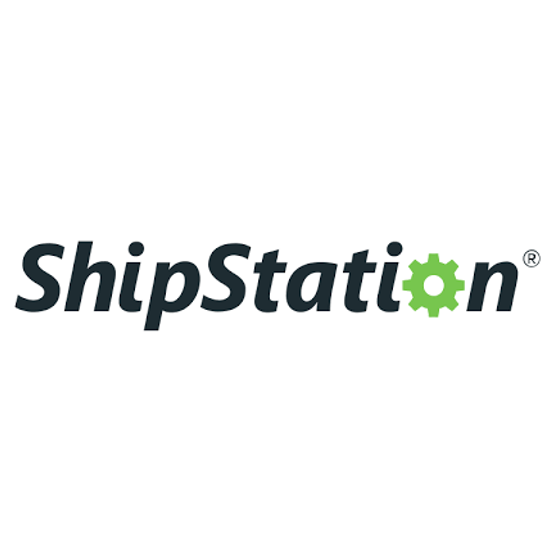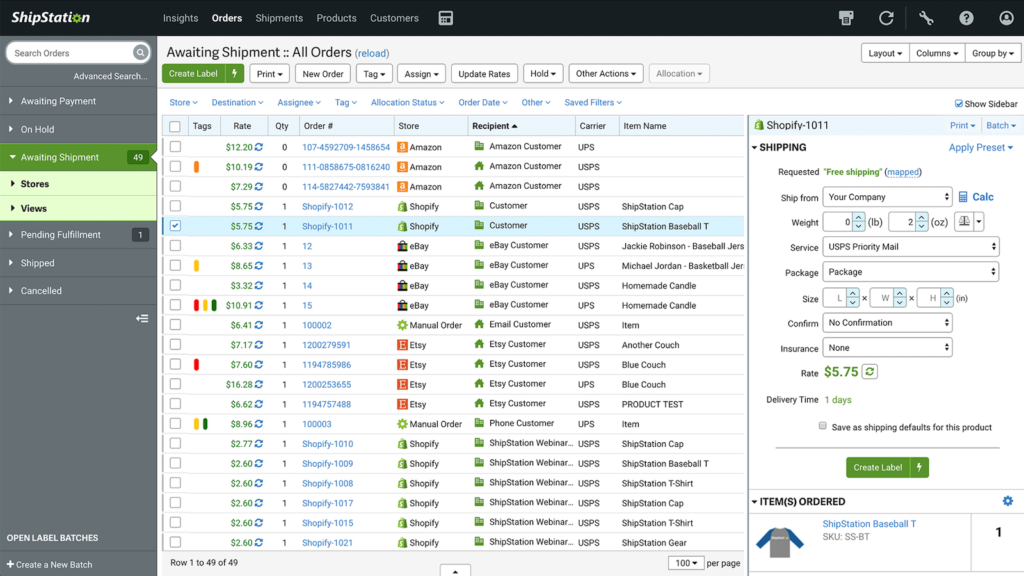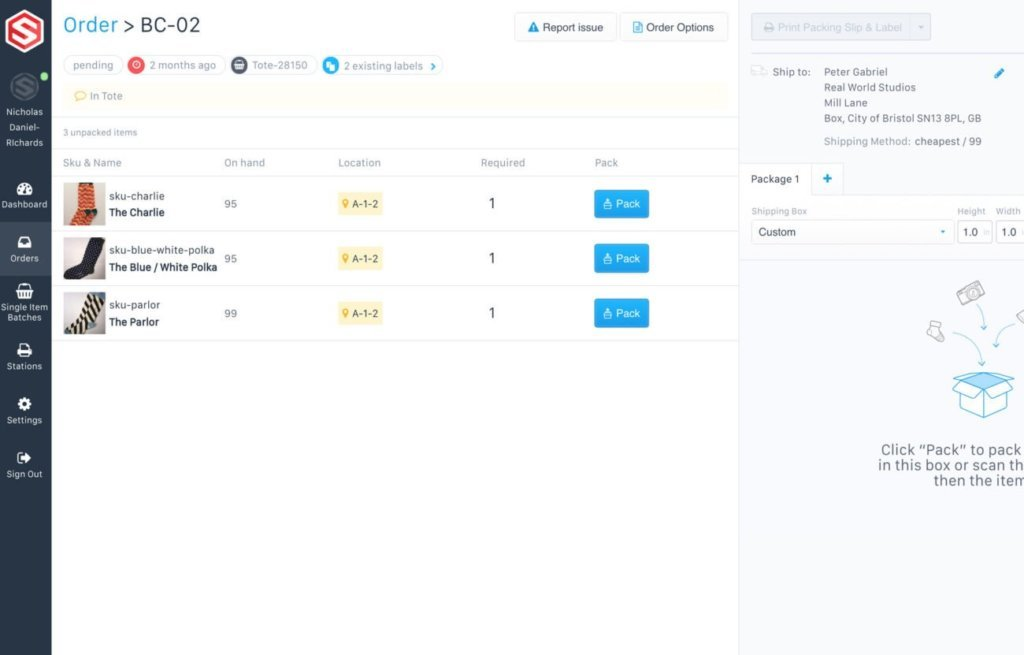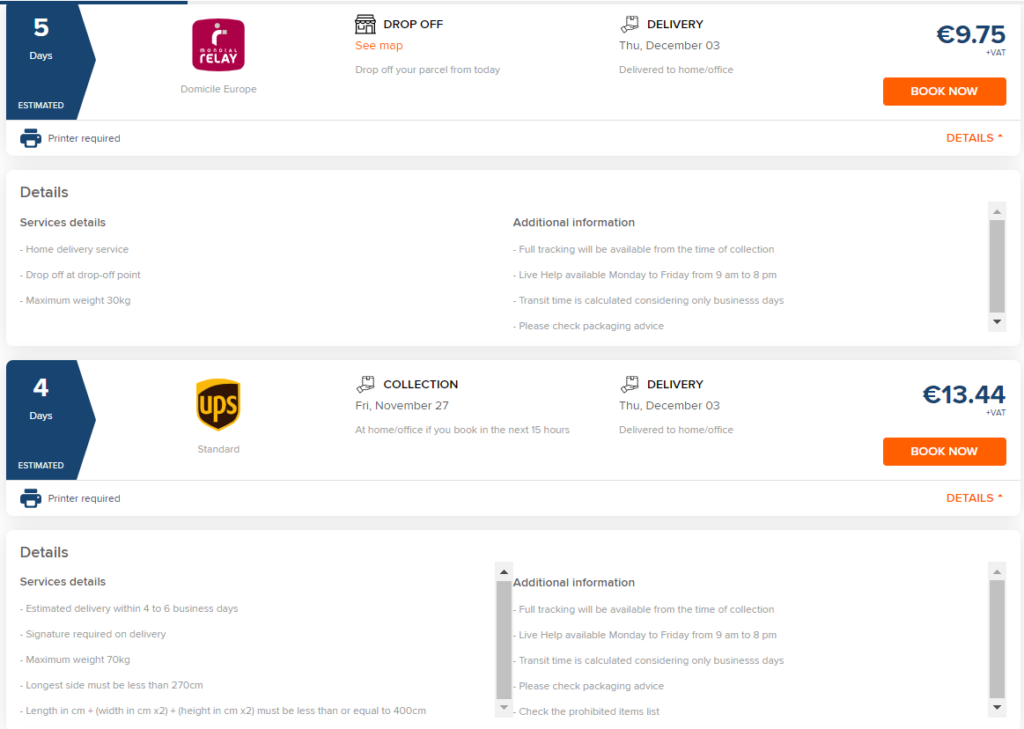10 Best Ecommerce Shipping Software
Here's my pick of the 10 best software from the 20 tools reviewed.
Our one-on-one guidance will help you find the perfect fit.
With so many different ecommerce shipping software solutions available, figuring out which is right for you is tough. You know you want to integrate various shipping carriers, automate label creation, and tracks shipments—but now need to figure out which tool is best. I've got you! In this post, I'll help make your choice easy, sharing my personal experiences managing ecommerce stores of all sizes, with my picks of the best ecommerce shipping software overall.
Why Trust Our Reviews
We’ve been testing and reviewing ecommerce software since 2018. As ecommerce managers ourselves, we know how critical, and difficult it is to make the right decision when selecting software.
We invest in deep research to help our audience make better software purchasing decisions. We’ve tested more than 2,000 tools for different ecommerce use cases and written over 1,000 comprehensive software reviews. Learn how we stay transparent & our software review methodology.
The Best Ecommerce Shipping Software Solutions Summary
| Tools | Price | |
|---|---|---|
| ShipBob | Pricing upon request | Website |
| ShipStation | From $9.99/month | Website |
| Pirate Ship | No price details | Website |
| ShipRush | From $29.95/user/month | Website |
| Shippo | From $10/month | Website |
| ShipHero | From $499/month | Website |
| Bolt Fulfillment | No price details | Website |
| Ascend TMS | From $79/user/month | Website |
| Packlink Pro | No price details | Website |
| Sure Shipped | No price details | Website |

Compare Software Specs Side by Side
Use our comparison chart to review and evaluate software specs side-by-side.
Compare SoftwareHow to Choose Ecommerce Shipping Software
When selecting software for your business, especially when considering a specialized tool such as ecommerce shipping software, it's essential to approach the decision with a strategic mindset. Here’s a checklist that balances general software selection principles with specific considerations for ecommerce shipping software:
- Compatibility: Ensure the software integrates seamlessly with your existing ecommerce platform and any other tools or systems you use, such as inventory management or customer relationship management (CRM) systems.
- Features and Functionality: Identify the key features necessary for your shipping operations, such as label printing, carrier integration, tracking, and automated shipping rules. Confirm the software meets these needs effectively.
- Scalability: Opt for a solution that can grow with your business, accommodating increasing order volumes and expanding product lines without significant additional costs or system changes.
- Carrier Flexibility and Rates: Look for software that offers a wide range of carrier options and competitive shipping rates, giving you the flexibility to choose the most cost-effective and timely shipping methods for your customers.
- Customer Support and Service: Evaluate the quality of customer support provided, including availability, response times, and access to helpful resources, ensuring you can get assistance when needed.
- Reviews and Reputation: Research user reviews and testimonials to gauge the software’s reliability, performance, and customer satisfaction, looking for any red flags or common issues.
By carefully considering these factors, you can select ecommerce shipping software that enhances your operational efficiency, improves customer satisfaction, and supports your business's growth.
Best Ecommerce Shipping Software Reviews
Here’s a brief description of each ecommerce shipping tool to showcase each tool’s best use case, some noteworthy features, and screenshots to give a snapshot of the user interface.
ShipBob offers a complete fulfillment service, including a full-stack software suite. Using this service, you can manage, track and control your ecommerce business. The software allows you to manage, edit and customize orders. You can also track real-time stock levels from any location and receive notifications when you reorder inventory.
ShipBob includes built-in reports and analytics modules. Ecommerce experts are also on hand to help you forecast, integrate, and orchestrate inventory and orders. This tool integrates with Shopify, BigCommerce, WooCommerce, and Magento.
ShipBob offers customized pricing on request.
ShipStation is a multi-channel, multi-carrier shipping suite for managing all aspects of ecommerce fulfillment. Features include discounted shipping rates, batching, customer branding, and inventory management. You can import orders from over 60 sales channels and automatically apply configurable presets and shipping options.
The software updates you with shipping status and tracking information for each channel. ShipStation also offers customizable packing slips, email, and tracking page templates. This makes it possible to brand your shipments and enhance the customer experience.
Additional features include prefilled international customs forms, detailed reporting, and advanced user permissions. This tool integrates with platforms such as Amazon, eBay, WooCommerce, DHL Express, and Shopify.
ShipStation costs from $9.99/user/month. A 30-day free trial is available.
Pirate Ship is a shipping management solution that assists in managing and streamlining processes related to purchasing and printing shipping labels. This cloud-based ecommerce platform allows you to search shipments at shipping companies, create USPS scan forms, and export transaction data.
The software offers a range of features, including ground shipping, shipment tracking, import/export, quotes, and estimates. You can also manage air and parcel shipping.
Admins can import orders from platforms such as WooCommerce, Cratejoy, Etsy, Shopify, and eBay. Using the shipping spreadsheet module, you can also upload addresses in various formats such as CSV, ODS, XLS, and XLSX.
This tool integrates with eCommerce platforms such as Shopify, WooCommerce, Chargify, Recurly, and Big Cartel.
Pirate Ship is available free of charge for any number of users.
ShipRush is a multi-carrier shipping platform that helps you manage order deliveries and notify customers of shipping status. This tool is available as either a cloud-based or on-premise solution. Features offered include inventory management, shipment history tracking, and reporting.
You can also print shipping labels. Managers can compare carrier rates and delivery options from the shipping rate shopping dashboard. They can also view transit times, shipping costS, and contracted rates. It’s also possible to create automation rules and print a shipping label for any order.
This tool integrates with third-party apps such as Authorize.net, BigCommerce, Magento, and QuickBooks.
ShipRush costs from $29.95/user/month. A 60-day free trial is available.
Shippo connects ecommerce sellers with the best rates at 85+ carriers and the United States Postal Service. After connecting your store, you can sync your sales channels to manage all orders in one place. The software tracks shipments and sends notifications to customers.
A return label can be generated automatically free of charge. Shippo offers analytics, insights, and reports. These include intelligent defaults plus configurable automations to keep you on top of shipping at all times. This is a no-code solution with no minimum volume requirements.
This tool integrates with platforms such as Square, Shopify, WooCommerce, and Wix. Shippo costs from $10/user/month.
A free 30-day trial is available.
ShipHero offers two different options for fulfillment. You can fulfill orders from your own warehouse, using ShipHero to manage the process. Alternatively, you can outsource the entire shipping process to them. The software manages the complete fulfillment process, from order to delivery.
Orders flow to pickers and packers for immediate processing. A personalized dashboard provides you with real-time monitoring to facilitate improved decision-making.
This tool integrates with platforms such as Shopify, BigCommerce, WooCommerce, Amazon, eBay, and Walmart. ShipHero software costs from .
A 30-day free trial is available.
Bolt Fulfillment is an order fulfillment platform that helps any business owner manage and fulfill orders. The solution includes advanced software for dealing with all aspects of logistics. The company receives and stores your inventory with the aim of reducing costs and optimizing delivery speed.
Orders are received in real-time, then picked, packed, and shipped promptly. Bolt aims to reduce shipping costs by 40% and get orders to customers three times faster. Features include optimized route planning and real-time truck tracking.
As a result, you can track all packages right to the door. This tool integrates with platforms such as Shopify, WooCommerce, and ShipStation.
Bolt Fulfillment offers customized pricing on request.
Ascend is a popular cloud-based supply chain management system. Core features include load management, branch administration, accounting, financial controls, and payment management. Using the load management capabilities, you can track supply orders, carriers, delivery dates, and distances.
You can also track the financials of load assignments to find the most profitable ones. GPS functionality helps you track the geographical location of carriers. Payroll management allows you to pay both contract and full-time drivers by mile, hour, pallet, or ton.
This tool integrates with applications such as SmartCapacity, Loadsmart, Truckstop, and CargoChief.
Ascend costs from $79/user/month. A free plan with limited features is also available.
Packlink is an online service that makes it easy to compare discounted rates at any shipping carrier and find a low cost shipping option. You can choose from standard, economy, or premium services. Using this service, you can save up to 50% on domestic shipments and 70% internationally.
Packlink Pro is a platform created specifically for ecommerce business owners. Having connected to your marketplaces, you can import your shipments and manage them from a single dashboard. The control panel also helps you track the status of shipments, from collection to delivery.
This tool integrates with ecommerce platforms such as WooCommerce, Magento, and Prestashop.
Packlink is offered as a totally free service.
SureShipped automates your online fulfillment, helping you save money on pick, pack, storage, and shipping services. The service covers direct-to-consumer, B2B, retail, FBA prep, and value-added services. Once your store is added to the system, the SureShipped team will store your products, add them to inventory and prepare them for shipping to customers the same day.
The system works with all major carriers both nationally and internationally. The SureShipped software includes multi-channel integrations, an admin dashboard, and reporting features. It also alerts you when stocks run low and keeps you informed of fulfillment status.
This platform integrates with Shopify, Amazon, WooCommerce, Magento, Walmart, and Etsy.
SureShipped offers customized pricing on request.
Other Ecommerce Shipping Software
Here are a few more that didn’t make the top list.
- ShipEngine
Best shipping API to connect with 100+ carriers
- Clickpost
Logistics intelligence platform for ecommerce sellers
- Detrack
Delivery management software offering real-time proof of delivery
- Calcurates
Cost-effective shipping for e-commerce with zero-coding
- GlobalShip
Integrated, multi-carrier shipping software for Microsoft-base sellers
- DesktoShipper
Ecommerce shipping solution for both small businesses and larger enterprises
- Freight Club
All-in-one shipping platform used by ecommerce leaders
- BuyCo
Collaborative platform that simplifies container management for large-volume shippers
- 2Ship
Online, multi-carrier shipping provider
- SKUlabs
Multi-carrier shipping platform for managing and syncing multichannel inventory
Related Ecommerce Software Reviews
If you still haven't found what you're looking for here, check out these related ecommerce tools that we've tested and evaluated.
- Ecommerce Platforms
- Inventory Management Software
- Payment Processing Software
- Shopping Cart Solutions
- Order Management Systems
- Warehouse Management Software
Selection Criteria for Ecommerce Shipping Software
Selecting the right ecommerce shipping software involves a careful evaluation of what they have to offer. Through extensive personal trials and research, I've developed criteria to guide software buyers towards making an informed decision.
Core Functionality: 25% of total weighting score
Ecommerce shipping software must excel in several key areas to meet the foundational needs of a business:
- Automated shipping label generation for a wide range of carriers
- Real-time tracking updates for both the seller and the buyer
- Carrier rate comparisons to ensure cost-effective shipping options
- Batch shipping capabilities for processing multiple orders efficiently
- Seamless integration with major ecommerce platforms for streamlined operations
Additional Standout Features: 25% of total weighting score
Identifying software that goes beyond the basics involves looking for:
- Advanced analytics and reporting tools for insights into shipping performance and cost
- Customizable branding options for packaging slips and labels to enhance the customer experience
- AI-driven logistics recommendations for optimizing shipping routes and methods
- Sustainable shipping options to appeal to eco-conscious brands and consumers
- Return management solutions that simplify the process for both businesses and customers
Usability: 10% of total weighting score
Ease of use is paramount, focusing on:
- Intuitive dashboard that provides a clear overview of shipping operations at a glance
- Drag-and-drop interface for organizing shipping workflows
- Quick access to frequently used features through customizable shortcuts or menus
- Mobile optimization to manage shipping needs on-the-go
Onboarding: 10% of total weighting score
Effective onboarding means assessing:
- Comprehensive training materials, including videos, guides, and FAQs, to reduce the learning curve
- Interactive product tours or demos that highlight key functionalities and workflows
- Responsive chatbots or live chat support for immediate assistance during the setup phase
- Engaging webinars or online workshops for deeper insights into maximizing the software’s value
Customer Support: 10% of total weighting score
Superior customer support is characterized by:
- Multiple channels for support, including email, phone, and live chat, ensuring accessibility
- Proactive monitoring and follow-ups on issues to ensure they are resolved satisfactorily
- A knowledgeable support team capable of providing in-depth assistance and best practices
Value For Money: 10% of total weighting score
Assessing value involves comparing:
- Transparent pricing models without hidden fees, offering clear insight into cost vs. features
- Flexible plans that scale with business growth, avoiding the need for frequent software switches
- Free trials or demo versions that allow businesses to test features before committing financially
Customer Reviews: 10% of total weighting score
When evaluating customer feedback, focus on:
- Consistency in positive experiences shared by users across different business sizes and types
- Specific mentions of how the software has solved logistical challenges or improved shipping efficiency
- Feedback on ease of use and the learning curve, indicating the software’s accessibility to new users
This criteria framework is designed to guide businesses toward ecommerce shipping solutions that not only meet their immediate needs but also support growth and enhance customer satisfaction in the long term.
Trends in Ecommerce Shipping Software for 2024
Here are some trends I’ve noticed for ecommerce shipping technology, plus what they might mean for the future of the ecommerce industry. I sourced countless product updates, press releases, and release logs to tease out the most important insights.
Integration of Artificial Intelligence and Machine Learning
Artificial Intelligence (AI) and Machine Learning (ML) are becoming indispensable in predicting shipping delays, optimizing routes, and managing inventories. This trend indicates a move towards more predictive and automated ecommerce logistics, reducing manual intervention and enhancing accuracy in delivery timelines.
Sustainable Shipping Options
With an increased emphasis on environmental responsibility, ecommerce shipping software is prioritizing carbon footprint tracking and offering sustainable shipping methods. This caters to the growing consumer demand for eco-friendly ecommerce practices, aligning environmental sustainability with business operations.
Blockchain for Security and Verification
Blockchain technology is being adopted for its ability to secure transactions and verify the authenticity of goods. This is particularly relevant for high-value items and helps combat fraud, ensuring a trustworthy ecommerce ecosystem.
Multi-carrier Management Systems
The rise of multi-carrier management systems indicates a trend towards flexibility in choosing shipping partners based on cost, speed, and reliability. This feature is essential for ecommerce businesses looking to optimize their shipping strategies in a competitive landscape.
Subscription-based Delivery Models
Subscription services for recurring deliveries are gaining popularity, reflecting a shift towards convenience and ongoing customer engagement. This model caters to the needs of both businesses and consumers by ensuring regular orders and fostering brand loyalty.
These trends underscore the industry's commitment to addressing the multifaceted challenges of ecommerce fulfillment, offering solutions that are not only efficient but also align with the evolving expectations of consumers and businesses alike.
What is Ecommerce Shipping Software?
Ecommerce shipping software is a tool designed for online businesses to manage and streamline their shipping processes. It integrates with multiple carriers, automates tasks like label printing and tracking, and often provides cost-effective shipping options.
The purpose is to simplify the complex logistics of delivering products to customers, ensuring efficiency and reliability in the fulfillment process, which is crucial for maintaining customer satisfaction and operational smoothness in ecommerce.
Features of Ecommerce Shipping System
When evaluating shipping solutions, I consider whether the software has the core features sellers are entitled to expect, including:
- Order management: The flexibility to batch, filter, sort, combine and manage orders in the most efficient way possible.
- Rate comparisons: Allowing you to view rates and service choices across all major carriers to choose the cheapest, fastest shipping method
- Rate discount options: Identifying carrier discounts that can be applied in return for high aggregate volume.
- Tracking and communication: rReal-time shipping confirmations for customers, plus the ability to track orders throughout the fulfillment process.
- Automation and rules: Setting rules to automate repetitive tasks, freeing staff to work on other matters.
- Pick management: The ability to print pick lists, shipping labels, and branded slips for error-free fulfillment.
- Reporting: Capturing all the data you need to analyze results and make informed business decisions.
- Returns management: Generating return labels and managing returned products.
- International shipping support: Features such as pre-populated customs forms that make it easy to manage overseas orders.
- Integrations: The software needs to integrate with multiple marketplaces, shopping carts, and other ecommerce software solutions.
Benefits of Ecommerce Shipping Software
Ecommerce shipping software has revolutionized how businesses manage their logistics, from the warehouse to the customer's doorstep. Here are five primary benefits these platforms offer:
- Optimized Shipping Routes and Costs - This software identifies the most efficient and cost-effective shipping routes. By automatically selecting the best carriers and shipping methods, businesses can significantly reduce their shipping expenses and improve delivery times.
- Automated Order Fulfillment and Tracking - Automation of key fulfillment processes minimizes manual errors and enhances efficiency. Users can track orders in real-time, providing transparency and improving customer satisfaction by keeping them informed every step of the way.
- Improved Inventory Management - Ecommerce shipping software offers real-time inventory tracking, which helps prevent stockouts and overstocking. Effective inventory management ensures that businesses can meet demand without tying up too much capital in inventory.
- Enhanced Customer Service - With features like automated notifications and easy returns management, these tools significantly improve the overall customer experience. This leads to higher customer retention rates and positive reviews, which are crucial for business growth.
- Scalability and Flexibility - The software grows with your business, easily adapting to increased order volumes and expanding product lines. This scalability ensures that businesses can expand their operations without the need for significant changes to their logistics infrastructure.
With these tools, ecommerce companies can achieve greater operational efficiency, cost savings, and a better customer experience, all of which are essential for thriving in today's competitive market.
Cost & Pricing for Ecommerce Shipping Software
Selecting the right ecommerce shipping software is a crucial decision that can significantly impact the efficiency and scalability of your online business. These software solutions come in various plans and pricing options to cater to the diverse needs and sizes of ecommerce businesses. Understanding the different available options will help you choose a software package that not only fits your current needs but also supports your growth ambitions. Below is a breakdown of typical plan options and their pricing, designed to guide software buyers with little to no experience in this area.
Plan Comparison Table for Ecommerce Shipping Software
| Plan Type | Average Price | Common Features Included |
|---|---|---|
| Starter | $9 - $29/month | Basic shipping features, limited shipments per month, email support, access to major carriers |
| Professional | $29 - $99/month | Advanced shipping features, increased shipment limit, chat support, analytics and reporting tools |
| Enterprise | Custom Pricing | Custom shipping solutions, unlimited shipments, 24/7 priority support, dedicated account manager |
| Free | $0 | Basic shipping capabilities, very limited shipments, community support, access to a few carriers |
When considering which plan to choose, think about your business's current size, expected growth, and specific shipping needs. A plan with a bit of room for growth can prevent disruptions and the need for frequent plan changes as your business evolves.
Frequently Asked Questions
Here are a few frequently asked questions I wanted to address before signing off.
Can ecommerce shipping software handle international customs and taxes?
Yes, many ecommerce shipping software solutions are designed to streamline the process of international shipping, including the management of customs and taxes. They typically provide tools for generating necessary customs documentation, calculating duties and taxes in advance, and ensuring compliance with international shipping regulations. This helps businesses avoid delays and penalties while offering transparency to customers regarding additional costs.
Are there mobile apps available for managing shipping on the go?
Yes, several ecommerce shipping platforms offer mobile apps that enable business owners and logistics managers to handle shipping tasks from anywhere. These apps often include features like shipment tracking, label creation, and coordination with carriers, making it easier for businesses to manage their shipping operations on the go and ensure timely updates and adjustments.
How do different software solutions compare in terms of cost-efficiency for small vs. large volumes?
The cost-efficiency of ecommerce shipping software varies widely depending on the size of your operations and the volume of shipments. Solutions tailored for small businesses often offer pay-as-you-go or low monthly subscription fees with basic features. In contrast, solutions for larger volumes may come with higher fees but offer extensive customization, automation, and integration options that can significantly reduce per-shipment costs and improve operational efficiency.
How can ecommerce businesses handle shipping for oversized or heavy items?
Ecommerce businesses can handle shipping for oversized or heavy items by partnering with carriers specialized in handling such goods, utilizing shipping software that offers freight options, and accurately calculating shipping costs to charge customers appropriately. Offering local pickup options and optimizing packaging to reduce dimensions and weight can also help manage the challenges and costs associated with shipping larger items.
What strategies can be used to reduce ecommerce shipping costs?
To reduce ecommerce shipping costs, businesses can negotiate rates with carriers, use shipping software for rate comparison and optimization, implement zone shipping to decrease distances, optimize packaging to reduce weight and dimensions, and offer multiple shipping options to customers. Leveraging bulk shipping discounts and considering hybrid shipping services that combine the resources of major carriers with local delivery services can also be effective.
How can ecommerce businesses offer competitive shipping times?
Ecommerce businesses can offer competitive shipping times by optimizing their fulfillment processes, strategically locating warehouses closer to their customer base, using automated shipping software for efficiency, and working with reliable carriers that offer express shipping options. Offering local pickup options and same-day delivery services in specific areas can further enhance shipping speed and customer satisfaction.
Other Fulfillment Tool Reviews
With ecommerce shipping software comes myriad other tools, services, and software to build out your ecommerce "bigger picture." Here are some additional review lists that you might be interested in:
- Order Fulfillment Software
- Fulfillment Services (outsourcing)
- Sustainable Packaging Manufacturers
- Shipping Solutions (outsourcing)
- Warehouse Management Software
- Pick and Pack Software
What Do You Think About This List?
So now you have a great selection of the best shipping company software to choose from. If I missed a good one or you disagree with my conclusions, feel free to share in the comment section. With the right software, you can delight your customers and grow your small business to new heights. It’s still Day One in the ecommerce world, so there’s a very bright future ahead!
Oh, and one more thing. Take a moment to sign up for our newsletter, so we can update you on the latest news and products.
Related Read:




















